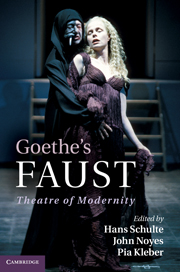Book contents
- Frontmatter
- Contents
- List of illustrations
- List of contributors
- Preface
- List of abbreviations
- Introduction
- PART I MODERNITY
- 1 Faust – today
- 2 Mephisto and the modernization of evil
- 3 Mephisto is the devil – or is he?
- 4 ‘Schwankende Gestalten’: virtuality in Goethe's Faust
- 5 Amnesia and anamnesis in Goethe's Faust
- 6 Magicians of modernity: Cagliostro and Saint-Simon in Goethe's Faust II
- 7 The blind Faust
- 8 From Faust to Harry Potter: discourses of the centaurs
- 9 Mistra and the Peloponnese in Goethe's Faust II
- 10 Goethe and the grotesque: the ‘Classical Walpurgis Night’
- 11 Re-defining classicism: antiquity in Faust II under the sign of the Medusa
- 12 Diabolical entrapment: Mephisto, the angels and the homoerotic in Goethe's Faust II
- PART II THEATRE
- Select bibliography
- Index
- References
5 - Amnesia and anamnesis in Goethe's Faust
Published online by Cambridge University Press: 01 June 2011
- Frontmatter
- Contents
- List of illustrations
- List of contributors
- Preface
- List of abbreviations
- Introduction
- PART I MODERNITY
- 1 Faust – today
- 2 Mephisto and the modernization of evil
- 3 Mephisto is the devil – or is he?
- 4 ‘Schwankende Gestalten’: virtuality in Goethe's Faust
- 5 Amnesia and anamnesis in Goethe's Faust
- 6 Magicians of modernity: Cagliostro and Saint-Simon in Goethe's Faust II
- 7 The blind Faust
- 8 From Faust to Harry Potter: discourses of the centaurs
- 9 Mistra and the Peloponnese in Goethe's Faust II
- 10 Goethe and the grotesque: the ‘Classical Walpurgis Night’
- 11 Re-defining classicism: antiquity in Faust II under the sign of the Medusa
- 12 Diabolical entrapment: Mephisto, the angels and the homoerotic in Goethe's Faust II
- PART II THEATRE
- Select bibliography
- Index
- References
Summary
In the dual conception represented by the German words Gedächtnis and Erinnerung, memory and remembrance has, for some time now, enjoyed considerable academic and popular discussion. The paradigms of this discussion have proved popular in cultural studies, from where they have migrated to general cultural and political debates. The programme of memory studies continues to be closely associated with the concept of identity in the sense of individual and collective self-definition. Since Freud, psychology has taught that the individual can only attain a healthy psychological existence through anamnesis, repetition and working through of personal history. More recently, sociologists and historians such as Maurice Halbwachs, Pierre Nora and Jan Assmann have shown how communities, religions, peoples and states understand their own constitution through long-term strategies of memory. Identity and memory, it would seem, are related proportionally to one another. The inability and the refusal to remember leads to a questionable definition of self. If individuals and collectives deny and repress specific (usually negative) aspects of their past, they are not able to attain unity with themselves, and their self-understanding becomes damaged, unstable and threatened.
It is interesting to note that, from the point of view of memory studies, Goethe's Faust is repeatedly evoked as an example of this kind of memory deficit and of the ensuing weakening of identity. Applied to a fictitious character on the stage, this syndrome is described as a lack of unity pertaining to character and its dramaturgical functions.
- Type
- Chapter
- Information
- Goethe's FaustTheatre of Modernity, pp. 68 - 77Publisher: Cambridge University PressPrint publication year: 2011



